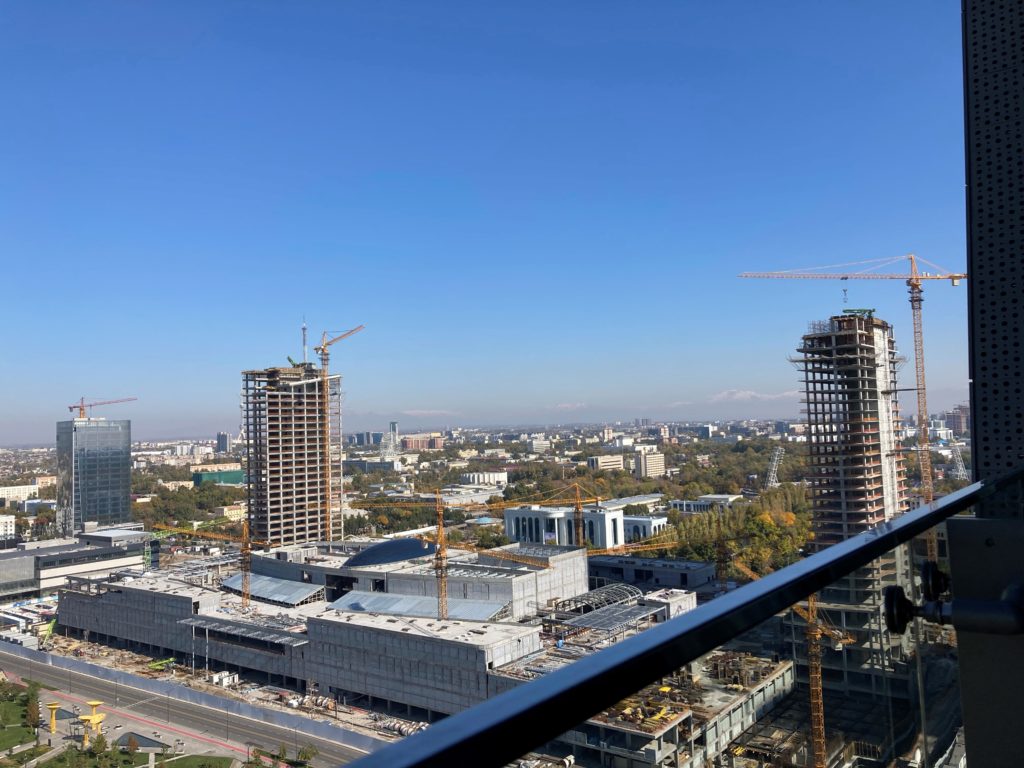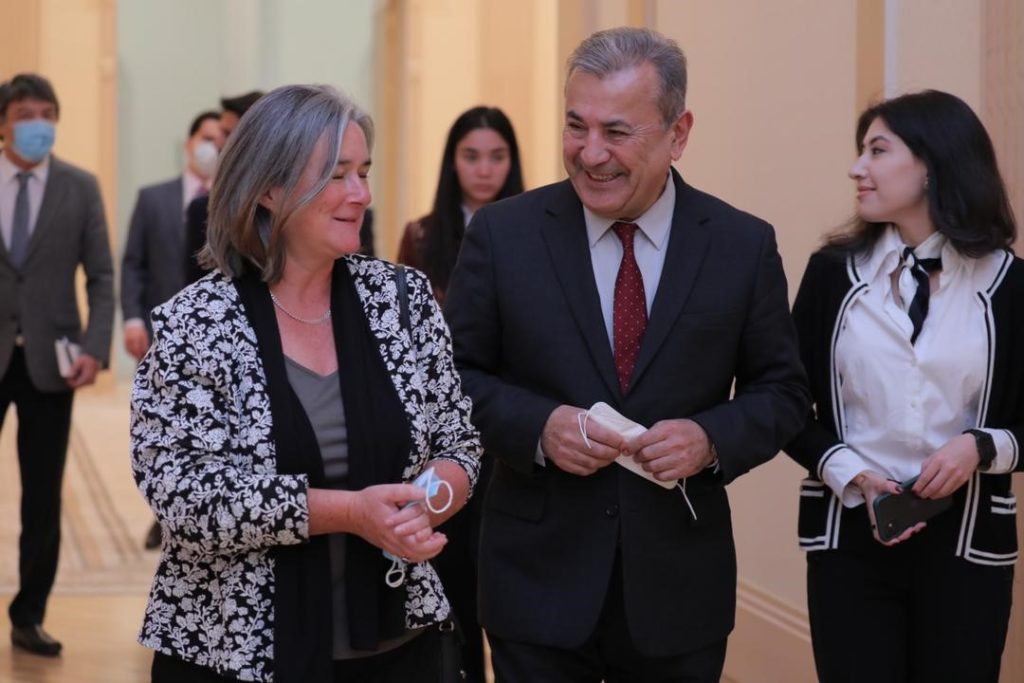Last month, alongside GPG’s Head of Programmes Zafran Iqbal, GPG Associate Baroness Alison Suttie visited the Uzbek capital, Tashkent, just as the country hosted its presidential elections. Returned from the visit, she examines the elections’ results, and what they reveal of Uzbekistan’s hopes for its future.
From the roof of our hotel in Tashkent you could see the construction work going on all around the city. Tashkent City Park just below our hotel was lit up at night and there were sound and light concerts with water fountains to celebrate the Presidential elections. That part of the city now feels like a thoroughly modern South East Asian city – even in the three year gap since my last visit in spring 2018, the pace of change and transformation in the city is almost breath-taking.
The majority of Tashkent, however, remains a model Soviet city. The whole city had to be rebuilt after the devastating 1966 earthquake which destroyed so much of the old quarters. As a result, Tashkent has a beautiful Soviet-style metro to rival Moscow’s and has the rows of apartment blocks that are familiar in all countries of the former Soviet Union.
Visitors who have in mind the ancient Silk Road cities may be surprised by the modernity of Tashkent but they would not be disappointed by the beauty of the Barak-Khan Madrassah, the Chorsu Bazaar, or the much more modern but stunningly beautiful White Mosque.

A view of modern Tashkent
Two-thirds of the population in Uzbekistan is under the age of thirty and it is currently projected that the population will rise to over 44 million by 2070. Uzbekistan has the largest population of all the countries of Central Asia and is currently at the forefront of development and reform in the wider region.
It was against this backdrop that President Shavkat Mirziyoyev was seeking to be elected for a second term on 24 October this year.
On all three of my visits to Uzbekistan I have been extremely well looked after by excellent “minders” who have helped to organise the daily programme during the visit, answer my numerous questions throughout, and have made sure that we have experienced the warm Uzbek culture and delicious food.
In 2018, during my last visit, my minder was Eldor Tulyakov who at that time was an MP and a member of the Finance Committee (Eldor is now the Director of the Strategy Development Centre).
On this visit, my two “minders” were Abdulla Azizov, the Deputy Minister for Health, and Umida, a second year university student. In many ways, they both represent the face of New Uzbekistan. Abdulla had worked in Denmark for fifteen years and wanted to bring his international experience and particularly his experience of digital reforms to Uzbekistan. Umida, who is eighteen and writes traditional Uzbek poetry, very much wanted to study in the UK and hoped to become an international interpreter.
We accompanied Umida to the polling station where she was registered to vote and watched as she cast her ballot for the first time. Like many of the younger people we spoke to on polling day, she said she was voting for stability and for the reforms to continue.
President Mirziyoyev was re-elected with 80.1% of the vote with a turnout of over 80%.
As Heidi Hautala from the European Parliament delegation noted, there were was still a lack of genuine competition in these elections. A considerable number of irregularities were reported. For example, several other international observers told me that they had witnessed incidences of multiple voting. I raised this issue with some of my senior Uzbek parliamentary colleagues and they acknowledged that this was an area where further progress needs to be made.
I think both my GPGF colleague, Zafran Iqbal, and I were very struck, however, by the very positive atmosphere we witnessed in the polling stations we visited. People seemed to be genuinely pleased to have the opportunity to vote. There was music playing in several of them and in some, there was even tea and cake available. Not things we would associate with voting in the UK ! Whatever criticisms can be justifiably made regarding the lack of choice at the vote, this presidential election was in many ways a referendum on Mirzoyoyev’s reforms, and so the result of over 80% indicates a willingness by the Uzbek population to continue down the road towards further modernisation and reform.

In conversation with Senator Sodiq Safoyev
Like most GPG Associates, I have hugely missed the face to face interaction you can have during in-country visits as part of our work. Zoom and other online platforms have provided an invaluable continuation of our work since Covid-19 prevented most foreign travel. However, there really is no substitute for that spontaneous human interaction you can have as part of a “physical” visit. I have always found that the informal exchanges that are possible outside of the formal meetings are vital in developing relationships based on trust that allow Associates to take on the vital role of critical friend and allow a genuine two-way dialogue.
During our week in Tashkent, we had a great many meetings with parliamentarians from the upper and lower house of the Uzbek Parliament – the Oliy Majlis. Some meetings were re-establishing contact with colleagues we have been working with for over a year now on our project in helping with the establishment of a new joint commission on Human Rights in the Uzbek parliament, which is substantially based on Westminster’s Joint Committee on Human Rights. We also had the opportunity to meet several younger parliamentarians – some of whom work directly with civil society organisations and are directly engaged with projects with young people and parliamentary outreach.
In a country like Uzbekistan that is going through rapid reform and change, establishing mechanisms of effective parliamentary monitoring and oversight are, I believe, particularly important. Implementation of reforms is always harder than passing the laws that introduced the reforms in the first place. Most of the people we spoke to in Tashkent recognised that the next stages of strategically planning and implementing the reforms – particularly in the regions – is going to be the next big challenge facing the country.
I have been visiting and working in Central Asia since 2014 and I feel very privileged to have seen first hand such remarkable changes taking place. There is so much more to do in Uzbekistan. The challenges are enormous – not least as a result of the recent events on its southern border with Afghanistan. But in Uzbekistan both the ambition and the willingness to learn from other countries is very positive. I look forward very much to seeing the continued developments in future visits to Tashkent.



